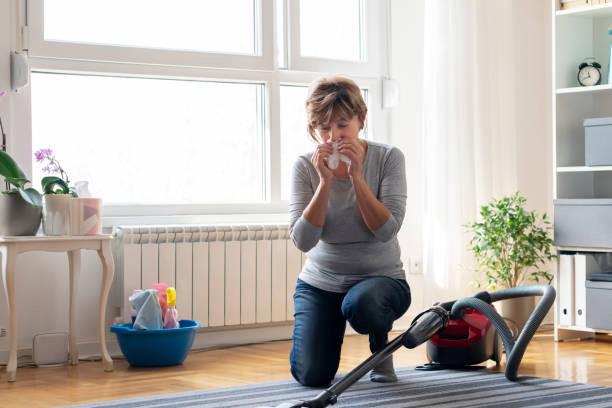
Carpeting traps allergens and irritants that can significantly degrade indoor air quality and exacerbate allergy and asthma symptoms for sensitive individuals. If you have signs of discomfort, staying clear of the carpet might be a good temporary solution. Let's explore the relationship between carpets and allergies and the steps needed to improve indoor air quality.
Carpets Harbor Common Allergens
Carpets are breeding grounds for allergens like dust mites, mold, and pet dander that provoke allergic reactions. If you appear to be allergic to carpet, here are some of the common issues and how you can identify them:
- Dust Mites - Feed on dead skin cells in carpets. Produce waste that contains allergy-triggering proteins.
- Mold and Mildew - Grow in the dampness under carpets due to trapped moisture. Release spores that spark allergies.
- Pet Dander - Shed by animals gets caught deep in carpet fibers. Trigger symptoms in people allergic to dander.
For people sensitive to these common allergens, carpeting results in allergy symptoms like coughing, sneezing, watery eyes, runny nose, and wheezing.
Steps to Improve Indoor Air Quality
While cozy, carpeting can degrade air quality due to its material or when poorly maintained. Here's how to improve it:
- Vacuum Using HEPA Filter - Traps allergens so they don't recirculate in the air.
- Choose Low-Pile Carpets - Low-pile is easier to clean thoroughly.
- Use Doormats - Trap dirt and allergens before they get inside.
- Steam Clean Carpets - Removes allergens missed by vacuuming.
- Professionally Clean Carpets - Every 6-12 months prevents allergen and mold buildup.
- Install Air Purifier - High-quality purifier filters out common allergens.
- Monitor Humidity Levels - Ensures moisture stays low to inhibit mold growth.
Conclusion
Carpeting traps irritants that degrade indoor air quality and worsen allergy and asthma symptoms. Frequently vacuuming, cleaning carpets thoroughly, using air purifiers, and monitoring humidity helps. If allergies persist, removing carpets entirely in favor of hard flooring or opting for easily cleanable options like area rugs for the living room can improve air quality.
Reach Out to Professionals
If you need guidance on carpets and allergies or improving indoor air quality, contact our experts today at Carpet Discount Warehouse. We can help you find high-quality rugs that complement your home environment and dream space.
